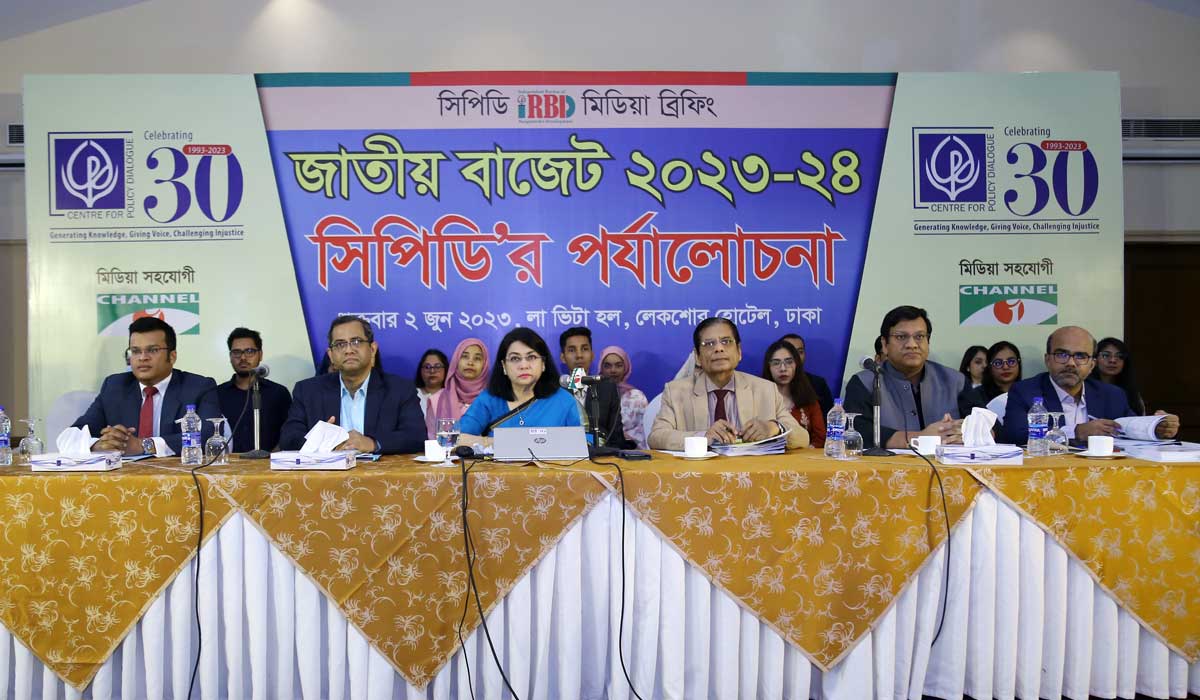
The National Budget for FY2023-24 has been placed at a time when the macroeconomic stability of Bangladesh weakened significantly. The negative developments on both domestic and external fronts contributed to this. The macroeconomic stress is visible through, inter alia, lower growth in revenue mobilisation and consequent shrinking of fiscal space; over-dependence on bank borrowing to finance budget deficits; high prices of essentials; and depreciating external sector balance and foreign exchange reserve. Milestones, such as Least Developed Countries (LDC) graduation in 2026 and Sustainable Development Goals (SDG) attainment by 2030, are ahead of Bangladesh. Also, the timeline of the International Monetary Fund (IMF) programme overlaps with these milestones. In view of this, the FY2023-24 budget called for tough choices amid a difficult time.
These observations were made at a media briefing on the analysis of the National Budget FY2023-24, organised by the Centre for Policy Dialogue (CPD). The media briefing was held on Friday, 2 June 2023. Following the presentation of the budget by the Hon’ble Finance Minister at the National Parliament on the day before, this analysis was prepared by the CPD team. Dr Fahmida Khatun, Executive Director of CPD, made the keynote presentation titled, “An Analysis of the National Budget for FY2023-24”. Like every year, the media briefing was broadcast live by Channel i for a broader audience.
In her presentation Dr Khatun said, “In the FY2023-24 budget, the underlying assumptions pertaining to the key macroeconomic correlates appear to be far from reality”. As a consequence, the budgetary targets set for FY2023-24 are likely to be missed by a substantial margin. The budget failed to address the most difficult challenge in the current reality, which is containing inflation. Overall, the budget for FY2023-24 failed to fully acknowledge the ongoing macroeconomic challenges and, therefore, offered inadequate remedial measures.
From the macroeconomic perspective, the targets set for the macroeconomic framework for FY2023-24 did not take cognisance of the current realities. The targets for private sector credit growth and inflation appear to be overambitious compared to the latest available figures as per official data.
“The rate of implementation of original Annual Development Programme (ADP) in FY2022-23 is likely to be no more than 80 per cent, even in the best-case scenario in view of current economic situation,” said the Executive Director. In that case, ADP for FY2023-24 will be more than 33.6 per cent higher than the actual spending in FY2022-23. The decline in Education and Health sectors’ share in ADP is perhaps a reflection of their poor implementation during FY2022-23. The allocation of mega projects has increased, but not the pace of implementation.
The budget for FY2023-24 has continued a complicated tiered tobacco tax structure that supports differential pricing. If enacted, the proposed tax on tobacco would encourage consumption of cheap cigarettes, increase public health costs, and reduce government revenue.
For locally manufactured soft and energy drinks, CPD recommends removing the supplementary duty and replacing it with a specific excise duty of BDT 0.10 per millilitre or BDT 100 per litre in order to minimise the public health risks.
The allocation for social safety nets has increased only by 7.34 per cent, which is lower than the average rate of increase of 15.65 per cent between FY2009-10 and FY2022-23. However, the allocation for pension has increased by 24.6 per cent, which is more than three times the rate of increase of overall social protection. In view of high prices of essential food items, the reduced budget allocation of Vulnerable Group Feeding (VFG), Employment Generation Programme for the Poorest (EGPP) and Open Market sales (OMS) will affect the poor.
In case of agriculture, it was observed that the allocation has reduced by 34.3 per cent from the revised budget of FY2022-23. The reasons for the reduction in subsidy allocation can be explained by upward revision of domestic fertiliser prices in August 2022 and April 2023, and global reduction in the price of urea.
The budget aims for employment generation, but the allocation increase is uneven across the Ministry of Industries, Employment, and Expatriate. Regrettably, the proposed budget indicates a significant decrease in the total allocation for the Ministry of Youth.
The overall ADP allocation in power and energy sector has increased by 19 per cent in FY2023-24 compared to FY2022-23. The allocation in transmission and distribution has been gradually increasing. However, the allocation is insufficient, but the generation has still been prioritised.
Anomaly has been observed in reporting the historical data in the climate budget for FY2023-24. The data of budgetary allocation for FY2019-20, FY2020-21, and FY2021-22 published in budget document for FY2023-24 are found to be inconsistent compared to previous years’ climate budget documents which led to complications within the analysis.
The budget for the Ministry of Chattogram Hill Tracts Affairs (MCHTA) has consistently decreased in the past budgets. Given the higher poverty rate among indigenous people in the Chittagong Hill Tracts, this continuous reduction may potentially worsen the situation and contradict the government’s commitment to inclusive growth.
Dr Khatun also said that estimations indicate that the current level of allocation will not ensure the completion of a number of important ADP projects in the transport sector in FY2023-24. Projects like Dhaka Ashulia Elevated Expressway are being “carried over” which eventually increases financial burden.
Allocations for significant programmes essential for the women empowerment and development have decreased in FY2023-24, which may result in limited support for gender-specific needs and slower progress in achieving gender-related targets.
Professor Mustafizur Rahman, Distinguished Fellow, CPD; Dr Khondaker Golam Moazzem, Research Director, CPD, Mr Towfiqul Islam Khan, Senior Research Fellow, CPD, Mr Muntaseer Kamal, Research Fellow, CPD, and Mr Syed Yusuf Saadat, Research Fellow, CPD were also present at the event. They shared their views through responses to the questions from media.


